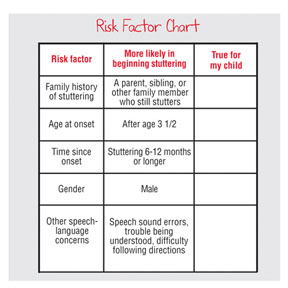
Stuttering Foundation and the American Speech-Language-Hearing Association Join Forces to Raise Awareness
MEMPHIS, Tenn. — More than three million Americans stutter, with children ages 2 to 5 affected most. Nearly 5 percent of all children go through some period of stuttering. But help for those who stutter is available. The Stuttering Foundation and the American Speech-Language-Hearing Association (ASHA) are working together during National Stuttering Awareness Week (May 10 to 16) to raise awareness with parents that early intervention is crucial to help children who stutter.
Many times, children stutter when learning to talk, typically between 2 and 5 years old. The major factors that place some children more at risk for continuing to stutter include:
Family history. Almost half of all children who stutter have a family member who stutters. The risk that your child is actually stuttering instead of just having normal disfluencies increases if that family member is still stuttering.
Age at onset. Children who begin stuttering before age 3 1/2 are more likely to outgrow stuttering.
Time since onset. Between 75 percent and 80 percent of all children who begin stuttering will stop within 12 to 24 months without speech therapy. In most children, stuttering tends to decrease after the first six months. If your child has been stuttering longer than this, it may be wise to have his speech screened.
Gender. Girls are more likely than boys to outgrow stuttering. In fact, three to four boys continue to stutter for every girl who stutters.
Other speech and language factors. A child who makes frequent speech errors such as substituting one sound for another or leaving sounds out of words may be at greater risk.
“Knowing these factors will help decide whether or not your child needs to see a speech-language pathologist,” says Lisa Scott, Ph.D., CCC-SLP, Vice President of Education for the Stuttering Foundation and ASHA-certified speech-language pathologist.
If a child has any of these risk factors and is showing some or all of the warning signs, a parent should be more concerned and seek a screening or evaluation. “Parents may want to schedule a speech screening with a speech-language pathologist who works with children or specializes in stuttering, states ASHA President Tommie L. Robinson, Jr, Ph.D., CCC-SLP. The speech-language pathologist will decide whether the child is stuttering, and then determine whether to wait a bit longer or begin treatment right away.”
For free information on stuttering and detailed explanation of each risk factor, contact the Stuttering Foundation at 800-992-9392 or ASHA at 800-638-Talk (8255). You may also visit www.stutteringhelp.org or www.asha.org.
Editor: Use the Risk Factor Chart as a sidebar with the release! Download chart.
About the Stuttering Foundation
The Stuttering Foundation provides resources, services and support to those who stutter and their families as well as support for research into the causes of stuttering. It provides education, training, and information to professionals, children and adults who stutter, parents, teachers and all those concerned about stuttering and is a valuable resource for speech pathologists working in the schools with children of all ages.
About the American Speech-Language-Hearing Association
ASHA is the national professional, scientific, and credentialing association for more than 140,000 audiologists, speech-language pathologists, and speech, language, and hearing scientists. Audiologists specialize in preventing and assessing hearing and balance disorders as well as providing audiologic treatment including hearing aids. Speech-language pathologists identify, assess, and treat speech and language problems including swallowing disorders.






 Podcast
Podcast Sign Up
Sign Up Virtual Learning
Virtual Learning Online CEUs
Online CEUs Streaming Video Library
Streaming Video Library